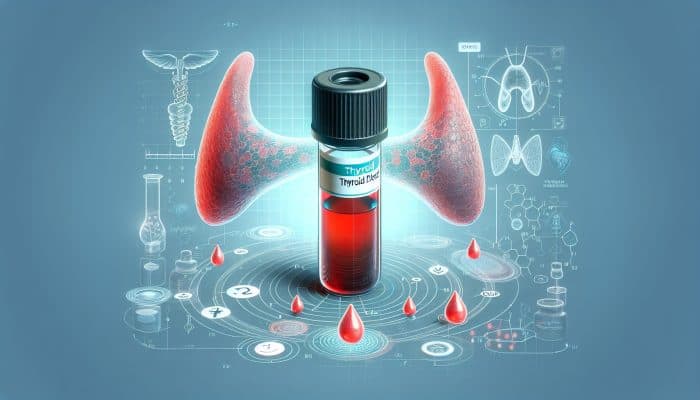Your Comprehensive Guide to Thyroid Blood Tests: Everything You Need to Know
Understanding Thyroid Blood Tests: Their Significance and Function

Thyroid Blood Tests conducted in Uppingham are crucial diagnostic tools that measure the levels of thyroid hormones circulating in your blood. This vital assessment helps in evaluating thyroid function, which is essential for maintaining your overall health. By analyzing these hormone levels, healthcare providers can effectively identify various thyroid disorders, paving the way for timely interventions and treatment strategies. The most common types of thyroid tests performed include:
- Thyroid-Stimulating Hormone (TSH) Test
- Free Thyroxine (FT4) Test
- Free Triiodothyronine (FT3) Test
- Thyroid Antibodies Test
- Thyroid Uptake Test
- Thyroid Scan
- Reverse T3 Test
These tests play a critical role in diagnosing conditions such as hypothyroidism, hyperthyroidism, and Hashimoto’s thyroiditis. Regular testing is essential for the early detection and effective management of thyroid-related disorders, ensuring better health outcomes for individuals who may be at risk.
The Essential Role of Regular Thyroid Testing in Maintaining Your Health
For individuals diagnosed with thyroid-related conditions or those who may be predisposed to such issues, regular thyroid testing is critical. Continuous monitoring of thyroid hormone levels is paramount for optimizing health and avoiding complications associated with thyroid disorders. The significant benefits of routine testing include:
- Early detection of potential thyroid issues
- Effective management of existing thyroid disorders
- Necessary adjustments to medication dosages
- Overall enhancement of health and well-being
Establishing a regular testing schedule can dramatically improve the quality of life while significantly decreasing the risk of severe complications. This proactive health approach empowers individuals to take charge of their overall wellness.
Recognizing Symptoms of Potential Thyroid Disorders: What to Watch For
Being able to identify symptoms related to thyroid disorders at an early stage is vital for timely medical intervention and effective treatment. Common symptoms to be vigilant about include:
- fatigue or persistent weakness
- Notable fluctuations in weight, either gain or loss
- Emotional swings, such as mood changes or depression
- Hair loss or thinning hair
- Increased sensitivity to cold or cold intolerance
- Heat sensitivity or excessive perspiration
- Irregularities in menstrual cycles
By remaining alert to these symptoms, individuals can seek medical advice sooner, which can lead to improved health outcomes and a better quality of life.
Preparing Effectively for Your Thyroid Blood Test: Essential Steps
Effective preparation is crucial for ensuring the accuracy of your thyroid blood test results. Recommendations may involve fasting for a designated period or temporarily discontinuing certain medications prior to the test. It is important to consult your healthcare provider for personalized guidance tailored to your specific health situation. Key preparations to keep in mind include:
- Avoiding biotin supplements for at least 48 hours before the test
- Fasting for 8-12 hours before the test if advised
- Informing your doctor about any medications you are currently taking
- Staying well-hydrated by drinking water prior to the test
By adhering to these preparation guidelines, you can ensure the most accurate results, enabling precise diagnosis and effective treatment planning.
Accurately Interpreting Your Thyroid Test Results: A Guide
Understanding the results of your thyroid tests is essential for effective health management. Test results typically report values for TSH, T3, and T4 hormones. Each of these values has a defined standard range, and any deviations could indicate potential health concerns. Consulting with a healthcare professional is crucial for interpreting these results accurately, as they can provide valuable context and personalized insights based on your unique health conditions. The normal ranges for these hormone levels generally include:
- TSH: 0.4 to 4.0 mIU/L
- Free T4: 0.8 to 1.8 ng/dL
- Free T3: 2.3 to 4.2 pg/mL
Abnormal results may indicate conditions such as hypothyroidism, hyperthyroidism, or other thyroid-related disorders that require further evaluation and management.
Expert Insights on Thyroid Blood Testing from Uppingham Professionals
Valuable Insights from Local Experts Regarding Thyroid Testing

Healthcare professionals in Uppingham emphasize the crucial importance of thyroid testing as a fundamental aspect of preventive healthcare. They advocate for regular screenings, particularly for individuals showing symptoms or having a family history of thyroid conditions. Real-life examples illustrate how early diagnosis through testing has enabled effective management of disorders such as hypothyroidism and hyperthyroidism. Experts frequently share success stories of patients who, after timely intervention, have significantly improved their quality of life. These insights underscore the essential role of thyroid testing in promoting health awareness and proactive care within the community.
Determining the Frequency of Your Thyroid Tests: Best Practices
The recommended frequency for thyroid tests varies based on individual health status, age, and risk factors. Generally, those diagnosed with a thyroid disorder should have their levels checked at least once a year. However, individuals experiencing new symptoms or changes in their health may require more regular evaluations. Consider implementing these actionable steps:
- Discuss with your healthcare provider to create a personalized testing schedule
- Request tests if you notice new or worsening symptoms
- Adjust testing frequency based on changes in medication or overall health
- Be mindful of family history and its implications for thyroid health
By taking these proactive measures, individuals can stay vigilant about their thyroid health and well-being.
Where to Access Thyroid Testing Services in Uppingham
Uppingham is home to several reputable medical facilities where residents can obtain thyroid blood testing services. These include local NHS hospitals, private clinics, and select pharmacies that offer testing options. When choosing the right facility, consider the following factors:
- Proximity to your home
- Qualifications and reputation of the medical staff
- Availability of testing appointments and services
- Insurance and payment options
Expert reviews suggest that selecting facilities with comprehensive thyroid care services can streamline ongoing management and monitoring of thyroid health, ensuring patients receive the highest standard of care.
Essential Preparations for Your Upcoming Thyroid Blood Test

Key Preparatory Steps to Follow Before Your Thyroid Test
Preparation is crucial for obtaining accurate thyroid test results, and there are specific steps that should be taken in advance. Essential preparations include:
- Consulting your healthcare provider for tailored instructions based on your health
- Avoiding biotin supplements for at least 48 hours prior to the test
- Fasting for 8-12 hours if recommended
- Staying hydrated by drinking water unless otherwise directed
By adhering to these preparatory steps, you can significantly improve the reliability of your thyroid blood test results, allowing healthcare professionals to make informed decisions based on the findings, ultimately leading to better health outcomes.
What to Expect During the Thyroid Blood Test Procedure
The procedure for a thyroid blood test is typically straightforward and minimally invasive. During the test, a healthcare professional will:
1. Clean the area on your arm where blood will be drawn.
2. Insert a needle into a vein to collect a blood sample.
3. Apply a bandage to the area afterward.
The entire process usually takes only a few minutes. While some individuals may experience slight discomfort or bruising, most find the procedure quite tolerable. Familiarizing yourself with this process can help alleviate any anxiety surrounding the test.
How Long Will It Take to Receive Your Thyroid Blood Test Results?
The timeline for receiving results from thyroid blood tests can differ based on the facility and the specific tests ordered. Typically, results may be available within 24 hours to a week. To expedite the process, individuals can:
- Request express testing options if available
- Follow up with the facility after the test
- Ensure all necessary paperwork and information are completed before testing
- Utilize online patient portals where results may be posted
Being proactive can greatly assist patients in accessing their results promptly, facilitating quicker discussions regarding treatment options if needed.
Decoding Your Thyroid Blood Test Results: What You Need to Know
Understanding the Significance of Your Thyroid Test Numbers
Comprehending the values of TSH, T3, and T4 is essential for accurately interpreting your thyroid health status. TSH levels indicate the effectiveness of the thyroid gland’s functioning, while T3 and T4 are the main hormones produced by the thyroid. Normal ranges for these hormones are typically:
- TSH: 0.4 to 4.0 mIU/L
- Free T4: 0.8 to 1.8 ng/dL
- Free T3: 2.3 to 4.2 pg/mL
Values that deviate from these ranges may indicate various conditions, including hypothyroidism or hyperthyroidism, necessitating further evaluation and comprehensive discussions with a healthcare provider to establish an effective management strategy.
When to Consult a Doctor About Your Thyroid Test Results
If your thyroid test results reveal abnormalities, it is crucial to consult a healthcare professional without delay. Signs that may warrant further evaluation include:
- Consistently elevated or low TSH levels
- New or worsening symptoms related to thyroid function
- Unexplained changes in weight or energy levels
- Family history of thyroid disease
Timely consultation can enable effective management, minimizing complications associated with untreated thyroid disorders and preserving overall health.
Strategies for Effectively Managing Thyroid Conditions
Managing thyroid conditions effectively typically requires a comprehensive approach that encompasses medication, lifestyle modifications, and regular health monitoring. Successful management strategies may include:
- Strict adherence to prescribed medication regimens to regulate hormone levels
- Incorporating a balanced diet rich in essential micronutrients that support thyroid health
- Engaging in regular physical activity to promote overall wellness
- Scheduling routine follow-up appointments to monitor thyroid function
Implementing these strategies can significantly improve quality of life, allowing individuals with thyroid conditions to lead healthier, more balanced lives and thrive.
Understanding the Costs Associated with Thyroid Blood Tests in Uppingham
Breaking Down the Financial Aspects of Thyroid Testing
The costs associated with thyroid blood tests in Uppingham can vary widely based on the testing facility and whether you opt for private or NHS services. Typically, NHS tests may be fully covered by healthcare plans, while private tests can range from £40 to £150 or more, depending on the complexity of the tests conducted. Factors influencing the cost include:
- Types of tests required
- Reputation and location of the testing facility
- Additional consultations or services included
- Insurance coverage and policies
Understanding these cost variables enables patients to make informed decisions about where and how they undergo testing, ensuring they receive the necessary care at an affordable price.
Exploring Affordable Options for Thyroid Testing
Accessing cost-effective thyroid testing in Uppingham is achievable through various avenues. Options include NHS services that offer testing at no cost to eligible patients and private clinics that may provide seasonal promotions or bundled services. Cost-saving strategies may encompass:
- Utilizing NHS facilities for free or low-cost testing
- Checking for private clinics that offer discounts during specific periods
- Asking your doctor for recommendations on affordable testing options
- Researching laboratory price comparisons
These strategies can significantly alleviate the financial burden associated with thyroid testing, allowing individuals to prioritize their health without incurring excessive costs.
Insurance Coverage for Thyroid Blood Tests: What You Should Know
Some health insurance plans may cover the costs associated with thyroid blood tests; however, coverage can vary significantly based on individual policies. To clarify your coverage, consider:
- Reviewing your insurance policy documentation regarding laboratory services
- Contacting your insurance provider for specific inquiries
- Inquiring with your healthcare provider about potential coverage options
- Seeking in-network providers to minimize out-of-pocket costs
Understanding your insurance coverage can help mitigate unexpected expenses and ensure access to necessary healthcare services, allowing for prompt diagnosis and treatment.
Where to Access Thyroid Testing Services in Uppingham
Residents of Uppingham can conveniently access thyroid blood tests at numerous locations, including:
- Local NHS facilities that provide comprehensive health services
- Private clinics specializing in thyroid health management
- Pharmacies offering blood testing services
- Laboratories that cater to direct-to-consumer testing options
Exploring these options can help individuals find reliable and accessible testing services tailored to their specific needs, ensuring they receive optimal care.
What Preparations Should You Follow for Your Thyroid Test?
Preparation for a thyroid blood test typically involves several straightforward steps to ensure the accuracy of the results. Key actions include:
- Adhering to any specific fasting requirements as instructed by your healthcare provider
- Avoiding biotin supplements or certain medications before the test
- Staying hydrated by drinking water unless otherwise directed
- Arriving at the testing facility with all necessary paperwork and identification
Following these preparation guidelines is crucial, as they can significantly impact the accuracy of test outcomes, ensuring optimal health management and care.
Research-Backed Benefits of Thyroid Blood Testing in Uppingham
What Recent Studies Show Regarding Thyroid Testing?
Recent research highlights the numerous advantages of regular thyroid testing in effectively managing health. Studies indicate that early detection through blood tests can lead to superior management of thyroid disorders, significantly reducing the risk of severe complications. Real-world examples reveal that patients who actively participate in routine testing are more likely to maintain stable hormone levels and experience fewer health issues related to thyroid dysfunction. These findings emphasize the importance of embracing a proactive approach to health management, which fosters better outcomes for individuals.
How Regular Testing Can Enhance Your Overall Health
Routine thyroid testing facilitates early detection and improved management of thyroid conditions, ultimately enhancing overall health and well-being. Individuals committed to consistent screening can enjoy various benefits, including:
- Timely interventions that prevent the progression of thyroid disorders
- Improved monitoring of treatment effectiveness and necessary dosage adjustments
- Increased awareness of personal health changes and symptoms
- Access to support and resources for implementing lifestyle modifications
These actions collectively contribute to better thyroid health and an elevated quality of life, empowering individuals to take control of their health.
Long-Term Benefits of Consistent Thyroid Testing
The long-term advantages of thyroid testing encompass better symptom management and a diminished risk of severe thyroid conditions. Continuous monitoring allows for:
- Ongoing assessment of thyroid function over time
- Proactive modifications to treatment plans as necessary
- Enhanced collaboration with healthcare providers
- Informed decision-making regarding lifestyle changes
Establishing a long-term strategy for thyroid health through regular testing can empower individuals, enabling them to take control of their well-being while minimizing the risks associated with thyroid disorders.
The Relationship Between Thyroid Blood Tests and Lifestyle Choices in Uppingham
The Impact of Your Diet on Thyroid Health
Your dietary choices significantly influence thyroid function, with certain foods either promoting or hindering thyroid health. Incorporating nutrient-dense foods can support optimal thyroid function. Beneficial foods for thyroid health include:
- Seafood, such as fish and shellfish, which are rich in omega-3 fatty acids
- Nuts and seeds high in selenium and zinc
- Leafy greens and cruciferous vegetables that help maintain hormonal balance
- Whole grains providing essential nutrients and fiber
Conversely, some foods may disrupt thyroid function, particularly those containing goitrogens (such as soy) when consumed excessively. Maintaining a well-balanced diet is essential for optimal thyroid health and overall wellness.
Can Regular Exercise Affect Thyroid Levels?
Engaging in consistent physical activity can positively influence thyroid hormone levels and overall thyroid function. Committing to a regular exercise regimen can benefit thyroid health by:
- Boosting metabolic rate and enhancing energy levels
- Improving mood and alleviating stress
- Supporting weight management that positively impacts thyroid function
- Enhancing cardiovascular health, contributing to overall wellness
Incorporating a blend of aerobic exercises, strength training, and flexibility workouts into your routine can help individuals maintain optimal thyroid health and improve their quality of life.
The Effects of Stress on Thyroid Function
Stress can have a profound impact on thyroid function, making effective stress management a critical aspect of overall thyroid health. Chronic stress may lead to hormonal imbalances that worsen thyroid disorders. Effective stress management techniques include:
- Practicing mindfulness and meditation
- Incorporating regular physical activity
- Establishing a consistent sleep routine
- Maintaining social connections and support networks
By implementing these strategies, individuals can improve their stress levels, positively influencing their thyroid function and overall health, ultimately leading to a more balanced and fulfilling life.
Common Thyroid Disorders Affecting Residents of Uppingham
Understanding Hypothyroidism: Symptoms and Treatment
Hypothyroidism is characterized by insufficient production of thyroid hormones, leading to a variety of symptoms that can significantly disrupt daily life. Common symptoms include fatigue, weight gain, and sensitivity to cold. Treatment for hypothyroidism primarily involves:
- Levothyroxine medication to replace deficient hormones
- Regular monitoring of TSH levels to adjust medication dosages
- Lifestyle modifications to enhance overall health
- Patient education on managing symptoms effectively
With appropriate treatment, individuals can manage their symptoms successfully, improving both their quality of life and overall well-being.
Recognizing Hyperthyroidism: Symptoms and Treatment Options
Hyperthyroidism is a condition marked by the excessive production of thyroid hormones, leading to various health challenges. Symptoms can include weight loss, rapid heartbeat, anxiety, and tremors. Timely recognition of hyperthyroidism is crucial for effective medical intervention. Treatment options may encompass:
- Antithyroid medications to reduce hormone production
- Radioactive iodine therapy to shrink the thyroid gland
- Surgical intervention in severe cases to remove part or all of the thyroid gland
- Regular monitoring of hormone levels and associated symptoms
With effective management, individuals can regain control over their symptoms and enhance their overall quality of life.
Understanding Thyroiditis: Causes and Treatment
Thyroiditis refers to the inflammation of the thyroid gland, which can lead to temporary fluctuations in thyroid function. The causes of thyroiditis may vary, including autoimmune disorders or infections. Diagnosis typically involves blood tests and imaging studies. Treatment options may include:
- Anti-inflammatory medications to alleviate inflammation
- Monitoring thyroid hormone levels for any fluctuations
- Addressing any underlying infections if present
- Lifestyle changes to support thyroid health
With appropriate medical care, most individuals can successfully manage thyroiditis and its associated symptoms, ultimately achieving optimal health.
Community Support Initiatives for Thyroid Health in Uppingham
Are Local Support Groups for Thyroid Health Available?
Uppingham hosts several support groups dedicated to individuals managing thyroid conditions. These groups provide a valuable sense of community and essential resources. To find and join these groups, interested individuals can:
- Contact local health services or hospitals for recommendations
- Search online platforms and social media for local thyroid support communities
- Participate in health fairs or community events focused on thyroid health
- Request information from healthcare providers regarding local initiatives
Engagement in these groups can offer emotional support and practical strategies for navigating the challenges associated with thyroid conditions.
Accessible Resources for Thyroid Health Support
A wide range of resources is available to promote thyroid health in Uppingham, spanning from online materials to local health services. Valuable resources include:
- National thyroid health organizations providing educational materials
- Local health clinics that offer screenings and informative resources
- Online forums for sharing experiences and advice
- Workshops and seminars focusing on thyroid health topics
Utilizing these resources can empower individuals to take control of their thyroid health, ultimately enhancing their overall well-being and quality of life.
How the Community Can Support Thyroid Health Awareness
The Uppingham community can play a vital role in supporting individuals with thyroid conditions through increased awareness and advocacy. Initiatives that the community can undertake include:
- Organizing health awareness campaigns focused on thyroid disorders
- Hosting educational events to inform the public about thyroid health
- Encouraging local businesses to support health initiatives
- Creating platforms for individuals to share their stories and experiences
By fostering a supportive environment, the community can aid individuals in navigating the complexities of living with thyroid conditions, ultimately improving their quality of life and health outcomes.
Frequently Asked Questions About Thyroid Blood Testing
What is the purpose of a thyroid blood test?
A thyroid blood test serves as a diagnostic tool that measures hormone levels produced by the thyroid gland, aiding in the diagnosis of various thyroid disorders.
How often is thyroid blood testing recommended?
Generally, individuals diagnosed with thyroid disorders should undergo testing annually; however, the frequency may vary depending on the severity of symptoms and overall health.
What symptoms may indicate a thyroid issue?
Symptoms such as fatigue, weight changes, and emotional fluctuations may suggest a thyroid problem, necessitating further testing for accurate diagnosis.
How should I prepare for a thyroid blood test?
Preparation may involve fasting, avoiding specific medications, and consulting your healthcare provider for tailored instructions based on your individual health.
When can I expect to receive my test results?
Results typically take anywhere from 24 hours to a week, depending on the facility and the specific tests performed.
What do abnormal thyroid test results indicate?
Abnormal results may signify thyroid dysfunction, such as hypothyroidism or hyperthyroidism, requiring further evaluation and management.
What lifestyle changes can promote thyroid health?
Maintaining a balanced diet, engaging in regular exercise, and practicing effective stress management can positively impact thyroid health and overall well-being.
What is the cost of a thyroid blood test in Uppingham?
Costs can range from £40 to £150, depending on the facility and whether services are provided through the NHS or privately.
Is thyroid blood testing covered by insurance?
Coverage varies by policy; it is advisable to check your plan for specific details regarding laboratory services and testing coverage.
Where can I access thyroid testing in Uppingham?
Thyroid blood tests can be performed at various local NHS facilities, private clinics, and some pharmacies in Uppingham, ensuring accessible options for residents.
Connect with us on Facebook!
This Article Was First Found On https://bloodtest.co.uk
The Article Thyroid Blood Test: Insights from Uppingham Locals Was Found On https://limitsofstrategy.com


